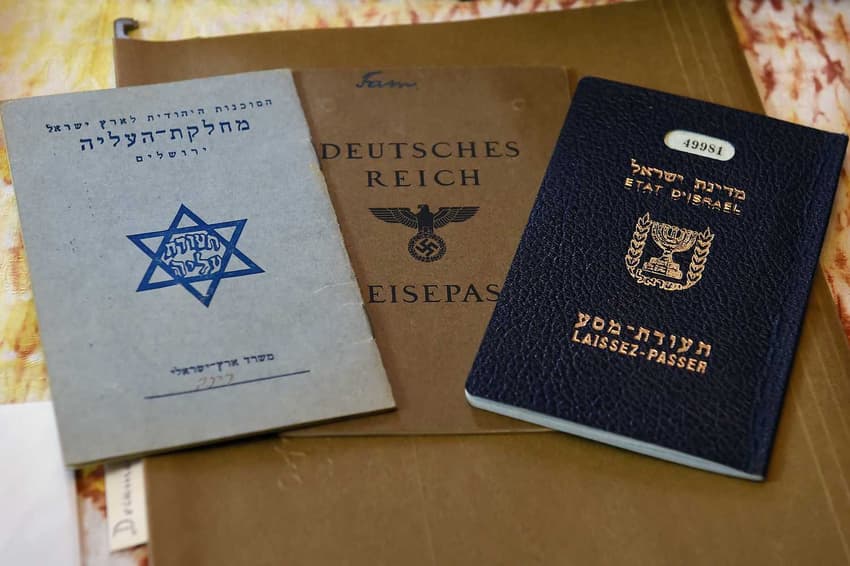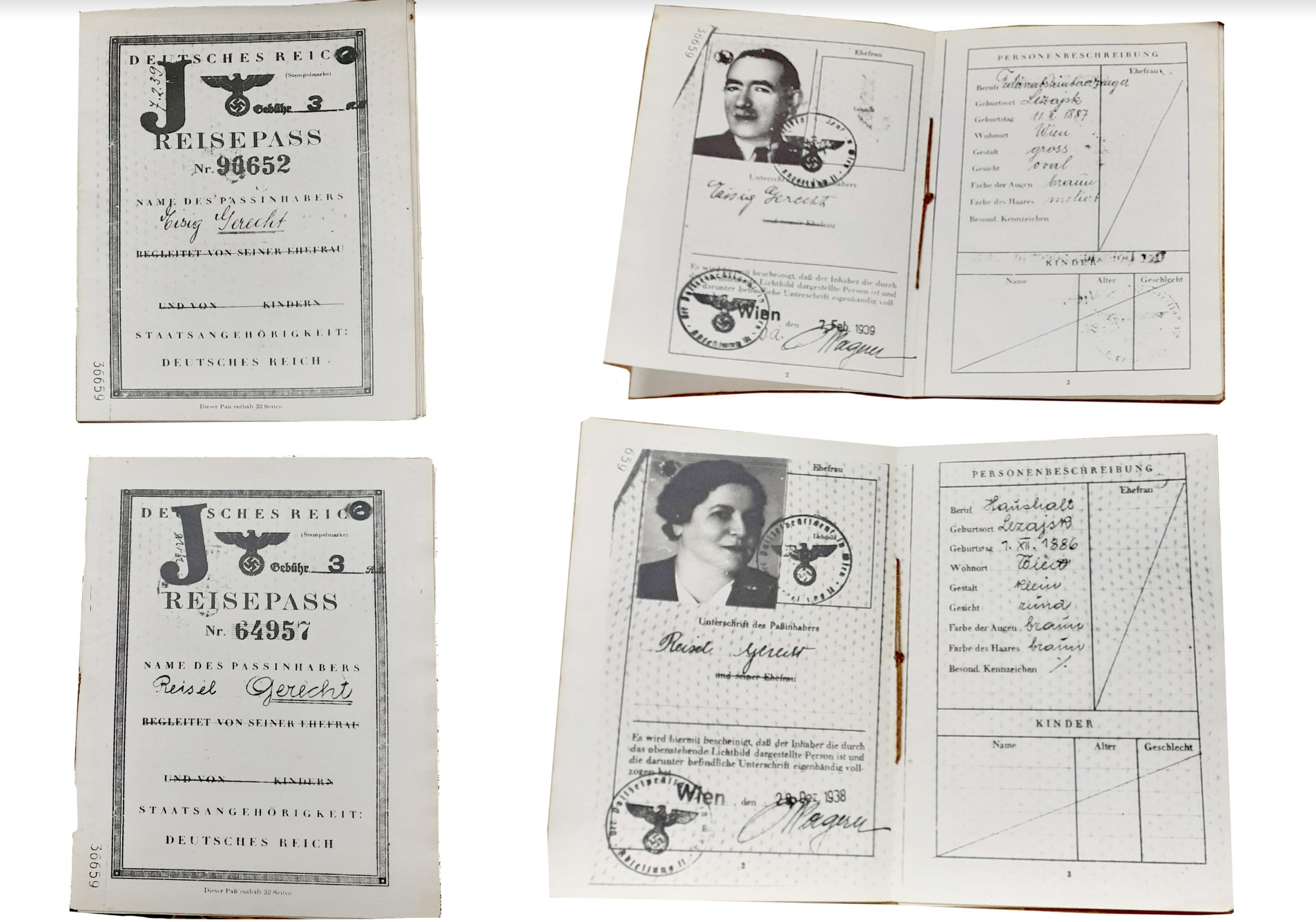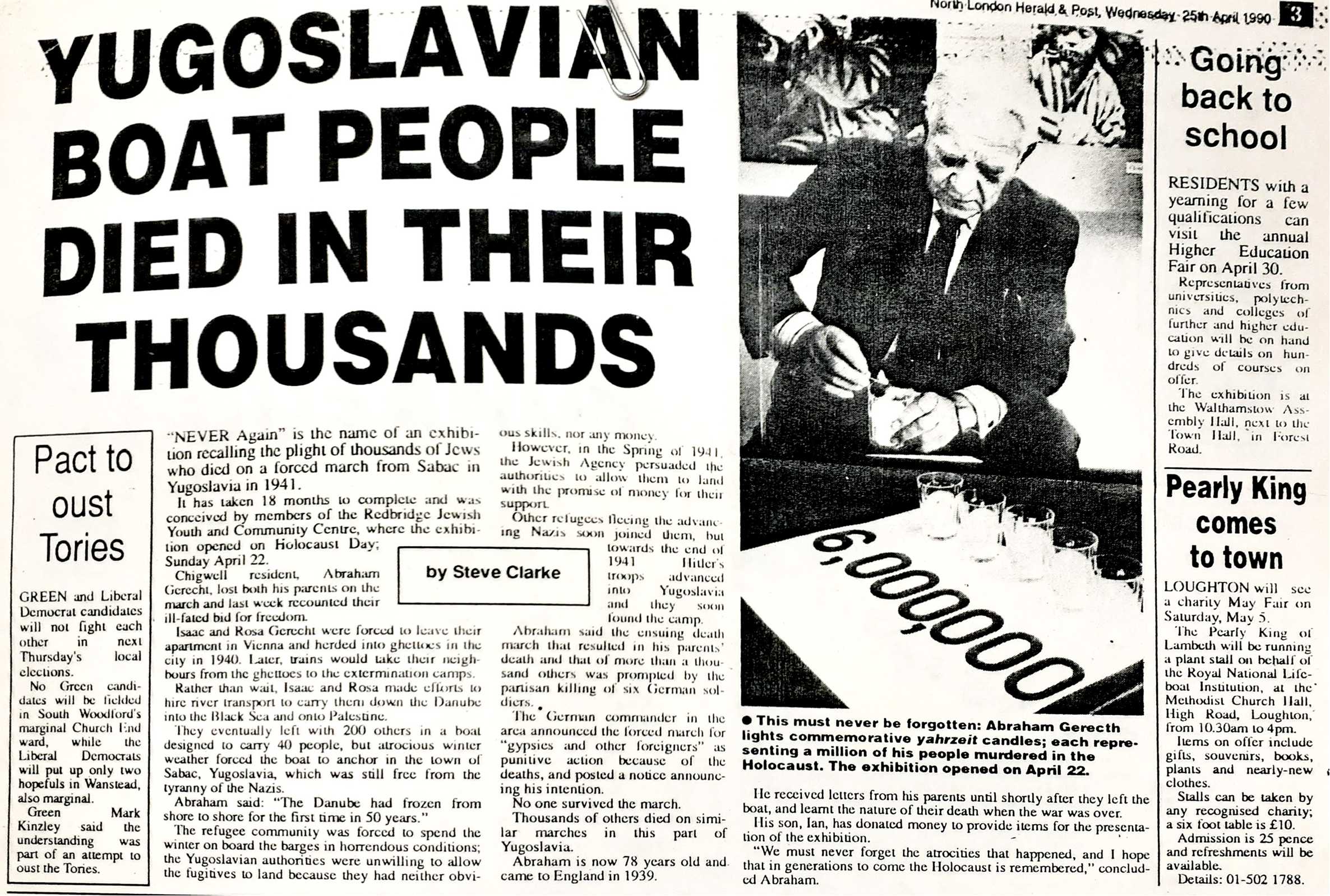INTERVIEW: By becoming Austrian I've reclaimed my family's terrible story

Thanks to a 2020 law change some victims of Nazism who forced to leave Austria have been able to apply to have their Austrian citizenship restored. One of them, Amber Catford, tells The Local how she did it and what it means for her family.
In 1949, Germany's Basic Law guaranteed the right for Nazi victims and their descendants to reclaim the German citizenship the Nuremberg laws previously stripped from them.
Although there have been some difficulties along the way for victims and their families to reclaim citizenship in this way in Germany, it is a stark contract to Austria. The Alpine nation only brought in a similar provision for Nazi victims in 1993 and one for their descendants just three years ago.
When the law passed on September 1st 2020, Amber Catford, a dual US-UK citizen originally from California and now living in Innsbruck, acted quickly - especially with Brexit looming at the time. She was the second person in Tyrol to apply to have her Austrian citizenship restored under the new law.
READ ALSO: How descendants of Nazism can apply for Austrian citizenship
"I think compared to Germany, Austria got to skirt around their role in the atrocities that were perpetrated under National Socialism a little bit more, and because of this, Austria was a lot slower to try to make up for their role in what happened," Catford tells The Local. "For me, from a purely practical standpoint, I'm just glad that I could do it, but it doesn't reflect well on Austria that it took them so long to get around to taking this step."
Catford's route to Austrian citizenship is also one of the few exceptions that permits dual or multiple citizenship under Austria's typically restrictive nationality law. It's also possible to apply for Austrian citizenship under this route even if the eligible person doesn't speak German or has never set foot in Austria.
READ ALSO: Five surprising Austrian citizenship rules you should know about
It applies to Austrian Jews, people who were stateless, and people who were citizens of successor states of the old Austro-Hungarian Empire who were resident in Austria at the time of the Nazis. While those applying to restore their Austrian citizenship under this provision may often be Jewish - or had Jewish ancestors - others who were persecuted under the Nazis may also apply.
They may have been targeted for other reasons, including political ones such as their support for democracy in Austria.

The passports of Amber Catford's great-grandparents, each stamped with a 'J' - indicating that the bearer is Jewish. Photo: Amber Catford
In 2022, the most common nationalities of people applying for Austrian citizenship through this route were Americans, Israelis and Brits. The 18 percent decline in Austrian citizenship applications in the first half of 2023 was largely driven by far fewer people applying from abroad, including under the reclamation provision.
"I would guess that a lot of people did it when the law was finally passed, and so now that the initial wave of people have done it, it makes sense that the numbers have dropped off," says Catford.
READ ALSO: Why are fewer people getting Austrian citizenship in 2023?
When the 2020 law was passed, Catford said she was pretty certain of her eligibility, but that searching for the various required documents among family members proved to be the biggest challenge, but it came with its rewards.
"It was fascinating and I learned a lot," she says. "Aside from documents of proof, I also needed to write my family history, detailing my grandmother's story.
"I'd always known the general outline of the family history, but it definitely made me feel closer to my grandmother to learn more details. It was emotional going through old documents and seeing things like old telegrams and some of the last communication my grandmother had with her parents," she says of her great-grandparents, the Gerechts, who died on a Nazi death march while trying to flee Europe.

A newspaper article detailing what happened to Amber Catford's great-grandparents. Photo: Amber Catford
"My grandmother grew up in Vienna, but went to Jerusalem quite a few years before the war to go to boarding school there as things in Austria started to get worse, so she was safely out of Austria when the war broke out. She had some minimal correspondence with her parents who were still in Vienna throughout the war, but lost contact at some point and didn't find out what happened to them until much later," Catford says.
Catford's grandmother Charlotte married Scot Ian Catford in Jerusalem in 1943 before moving to Scotland and later to the US in 1965. Amber would move to Austria herself in 2013.
"That Austria is now my home, however, feels rather serendipitous. I didn't plan to move here, but in following my heart, this is where I landed and I'd made it my home, even before this law came into effect," she says of having moved to the country to be with her now husband. "There may be a sad history behind the reason I can gain citizenship, but it is something special to come back to a place these many years later and reclaim a small piece of my family history."
Catford and her husband are expecting their first child in November.
"Austria feels like home in a lot of ways, now after 10 years here, it is still just a small part of my identity," she says. "It will be interesting to see how that might change raising a child here who will grow up with Austria as their home, though."
EXPLAINED: Who is entitled to Austrian citizenship by descent and how to apply for it?
Comments
See Also
In 1949, Germany's Basic Law guaranteed the right for Nazi victims and their descendants to reclaim the German citizenship the Nuremberg laws previously stripped from them.
Although there have been some difficulties along the way for victims and their families to reclaim citizenship in this way in Germany, it is a stark contract to Austria. The Alpine nation only brought in a similar provision for Nazi victims in 1993 and one for their descendants just three years ago.
When the law passed on September 1st 2020, Amber Catford, a dual US-UK citizen originally from California and now living in Innsbruck, acted quickly - especially with Brexit looming at the time. She was the second person in Tyrol to apply to have her Austrian citizenship restored under the new law.
READ ALSO: How descendants of Nazism can apply for Austrian citizenship
"I think compared to Germany, Austria got to skirt around their role in the atrocities that were perpetrated under National Socialism a little bit more, and because of this, Austria was a lot slower to try to make up for their role in what happened," Catford tells The Local. "For me, from a purely practical standpoint, I'm just glad that I could do it, but it doesn't reflect well on Austria that it took them so long to get around to taking this step."
Catford's route to Austrian citizenship is also one of the few exceptions that permits dual or multiple citizenship under Austria's typically restrictive nationality law. It's also possible to apply for Austrian citizenship under this route even if the eligible person doesn't speak German or has never set foot in Austria.
READ ALSO: Five surprising Austrian citizenship rules you should know about
It applies to Austrian Jews, people who were stateless, and people who were citizens of successor states of the old Austro-Hungarian Empire who were resident in Austria at the time of the Nazis. While those applying to restore their Austrian citizenship under this provision may often be Jewish - or had Jewish ancestors - others who were persecuted under the Nazis may also apply.
They may have been targeted for other reasons, including political ones such as their support for democracy in Austria.

In 2022, the most common nationalities of people applying for Austrian citizenship through this route were Americans, Israelis and Brits. The 18 percent decline in Austrian citizenship applications in the first half of 2023 was largely driven by far fewer people applying from abroad, including under the reclamation provision.
"I would guess that a lot of people did it when the law was finally passed, and so now that the initial wave of people have done it, it makes sense that the numbers have dropped off," says Catford.
READ ALSO: Why are fewer people getting Austrian citizenship in 2023?
When the 2020 law was passed, Catford said she was pretty certain of her eligibility, but that searching for the various required documents among family members proved to be the biggest challenge, but it came with its rewards.
"It was fascinating and I learned a lot," she says. "Aside from documents of proof, I also needed to write my family history, detailing my grandmother's story.
"I'd always known the general outline of the family history, but it definitely made me feel closer to my grandmother to learn more details. It was emotional going through old documents and seeing things like old telegrams and some of the last communication my grandmother had with her parents," she says of her great-grandparents, the Gerechts, who died on a Nazi death march while trying to flee Europe.

"My grandmother grew up in Vienna, but went to Jerusalem quite a few years before the war to go to boarding school there as things in Austria started to get worse, so she was safely out of Austria when the war broke out. She had some minimal correspondence with her parents who were still in Vienna throughout the war, but lost contact at some point and didn't find out what happened to them until much later," Catford says.
Catford's grandmother Charlotte married Scot Ian Catford in Jerusalem in 1943 before moving to Scotland and later to the US in 1965. Amber would move to Austria herself in 2013.
"That Austria is now my home, however, feels rather serendipitous. I didn't plan to move here, but in following my heart, this is where I landed and I'd made it my home, even before this law came into effect," she says of having moved to the country to be with her now husband. "There may be a sad history behind the reason I can gain citizenship, but it is something special to come back to a place these many years later and reclaim a small piece of my family history."
Catford and her husband are expecting their first child in November.
"Austria feels like home in a lot of ways, now after 10 years here, it is still just a small part of my identity," she says. "It will be interesting to see how that might change raising a child here who will grow up with Austria as their home, though."
EXPLAINED: Who is entitled to Austrian citizenship by descent and how to apply for it?
Join the conversation in our comments section below. Share your own views and experience and if you have a question or suggestion for our journalists then email us at [email protected].
Please keep comments civil, constructive and on topic – and make sure to read our terms of use before getting involved.
Please log in here to leave a comment.